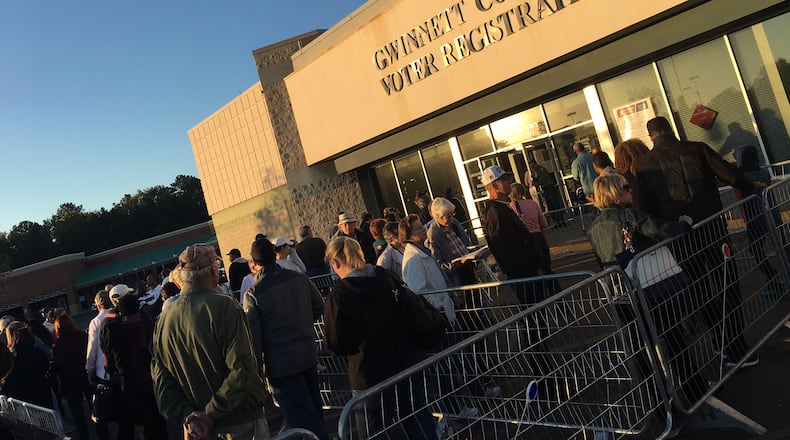At roughly $13,000, it's among the smallest line items in Gwinnett County's proposed 2018 budget, a tiny drop in a bucket that holds nearly $1.7 billion.
But approving the money necessary to add Sunday voting during next year’s general election — which will include a gubernatorial race and two local commission seats —has Gwinnett advocates riled up.
“Sunday voting is not something we should have to ask for,” resident Penny Poole said during a Monday night public hearing on Commission Chairman Charlotte Nash’s proposed budget. “It should be a normal process for people who want to make sure that as many people as possible have the right to exercise their vote.”
Poole was one of about 10 folks who spoke in favor of Sunday voting during the hearing. Only 13 people spoke in all.
Read more about Gwinnett’s proposed 2018 budget here.
Early Gwinnett voters often waited for hours to cast their ballots in last November's presidential election, and the county elections office requested funding for more advance voting — including at least a half day of Sunday voting — in the business plan it presented to Nash in August.
In a recent interview with The Atlanta Journal-Constitution, Nash said the money for more advance voting, including Sunday voting, is already included in her proposed 2018 budget. But it’s likely to be placed in a reserve fund until the county knows how many poll workers it’s going to be able to recruit.
Also key in Gwinnett's decision will be the requirements of a federal designation handed down last year by the U.S. Census Bureau. The designation comes with a mandate for the county to offer Spanish-language ballots, elections materials and other assistance to voters who need them.
The mandate means, among other things, that the county will have to staff a Spanish-speaking poll worker at each poll location whenever it’s open.
“I have a big concern about our ability to have enough poll workers to do what we're mandated to do,” Nash said.
Some officials in Georgia and elsewhere have previously pushed back against Sunday voting, arguing that it favors Democrats. In 2014, state Sen. Fran Millar, a Republican from Dunwoody who also represents part of Gwinnett, was involved in a public spat with other officials after taking issue with Sunday voting being held only in traditionally Democratic areas of DeKalb County.
At least eight Georgia counties opened their polls for Sunday voting during the Nov. 2016 election. Half of them — Clayton, DeKalb, Fulton and Henry — were in the metro Atlanta area and most were in traditional Democratic strongholds.
Many of the people who spoke in favor of Sunday voting at Monday night’s meeting were tied to the Gwinnett County Democratic Party.
Gwinnett is a deeply diverse community of more than 900,000 people and, politically, appears to be turning purple. It went for Hillary Clinton in 2016's presidential election, the first time the county had chosen a Democratic candidate since Jimmy Carter in 1976.
Advocates that spoke Monday night, though, insisted that the issue wasn’t a partisan one. And Stephen Day, the chairman of Gwinnett’s Board of Registrations and Elections, said Sunday voting has been “the most requested action” at recent meetings of that body.
Day, who spoke during Monday night’s budget hearing, called adding more advance voting a “do or die” issue.
Nash said she wants that to happen, but reiterated that there are other things to consider.
“The worst thing we can do is to open more days, say we’re going to be open, and not be able to accommodate people properly,” she said. “So it’s just really, really critical that we have sufficient poll workers to ensure that we can do everything that needs to be done with each of those sites.”
The Board of Commissioners is expected to vote on Nash's proposed 2018 budget during its Jan. 2 meeting. Public comment can be submitted online through Dec. 31.
This article was updated to add further context to statements made in 2014 by state Sen. Fran Millar.
In other Gwinnett news:
About the Author
Keep Reading
The Latest
Featured



